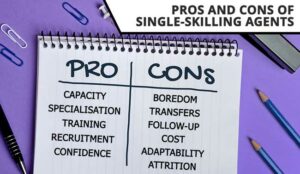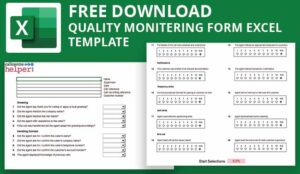Agent self-evaluation is becoming an increasingly popular tool in contact centres. Allowing agents to review their own performance encourages personal growth and helps improve customer interactions.
Kim Ellis, Chief Learning Architect at Go Ginger Learning Solutions, takes a closer look at how agent self-evaluation works, along with its benefits and potential challenges.
What Is Agent Self-Evaluation?
Agent self-evaluation is when agents take an active role in assessing their own performance. It involves having agents review their own work, particularly their interactions with customers, to better understand their strengths and areas for improvement.
This process is highly beneficial for both the business and the agent, as it helps agents become more engaged in the quality assurance (QA) process.
By doing so, agents gain valuable insights into how they interact with customers, which can lead to more thoughtful and effective customer service.
What Are the Different Ways to Do Agent Self-Evaluation?
There are two primary methods for encouraging agent self-evaluation:
1. Listening to a Call
One of the easiest ways to start is by asking agents to listen to one of their own recorded customer calls. This allows them to hear how they come across to the customer and identify areas for improvement.
Listening back to their own performance gives agents a clearer sense of what works well and what could be better.
2. Completing a QA Checklist
Another way to involve agents in self-evaluation is by having them complete the same call quality checklist that the QA team uses to evaluate performance.
This lets agents compare their self-assessment with the official evaluation, helping them see how they measure up against the company’s targets and metrics.
It can provide a more structured approach to self-evaluation, making sure they focus on key performance indicators (KPIs).
What Are the Pros of Agent Self-Evaluation?
There are several strong benefits to agent self-evaluation:
Self-Awareness
One of the biggest advantages is that agents become more self-aware. By reviewing their own calls, agents can understand how they sound to the customer.
It’s not just about the information they provide or the tasks they complete; a lot also depends on their tone of voice, pace, and how they present themselves.
Agents can reflect on how their posture, breathing, or even their environment may affect their tone and pacing during the call.
Improvement Opportunities
Self-evaluation allows agents to identify areas where they can improve. They might realize they missed some details during the call or took longer to find the necessary information.
Agents may notice ways to streamline processes, such as providing quicker responses, finding information faster, or efficiently transferring customers to the right department. This helps them deliver a better overall customer experience.
Empowerment
Involving agents in their own assessment makes them feel more in control of their development. This sense of ownership often leads to greater motivation and engagement, as agents see direct links between their actions and their performance improvement.
What Are the Cons of Agent Self-Evaluation?
Despite the advantages, there are some potential downsides to agent self-evaluation:
Confidence Knock
If an agent believes they are doing well but finds otherwise through self-evaluation, it can hurt their confidence.
When agents listen back to their calls and realize they’re not performing as well as they thought, it can be discouraging.
In these cases, additional coaching and support are crucial to help rebuild their confidence and guide them through the areas needing improvement.
Lack of Clear Understanding
Another issue is that agents might not know what to focus on during their self-evaluation. Without proper guidance, they may overlook key elements of their performance.
For example, an agent might concentrate solely on their tone of voice and miss the importance of active listening or problem-solving during the interaction.
If the agent isn’t clear on what “great performance” looks like, they could end up focusing on the wrong areas, which diminishes the effectiveness of the self-evaluation process.
With thanks to Kim Ellis, Chief Learning Architect at Go Ginger Learning Solutions, for contributing to this video.
If you are looking for more great insights from the experts, check out these videos next:
- The Secrets to Writing Better Customer Emails
- What’s the Best Sample Size for Quality Scoring?
- Using the 3 Strike Rule in the Contact Centre
- How to Use the Sandwich Technique for Customer Service
Author: Kim Ellis
Reviewed by: Megan Jones
Published On: 29th Oct 2024 - Last modified: 14th Mar 2025
Read more about - Video, Call Quality, Coaching, Feedback, Kim Ellis, Quality, Top Story, Training


















